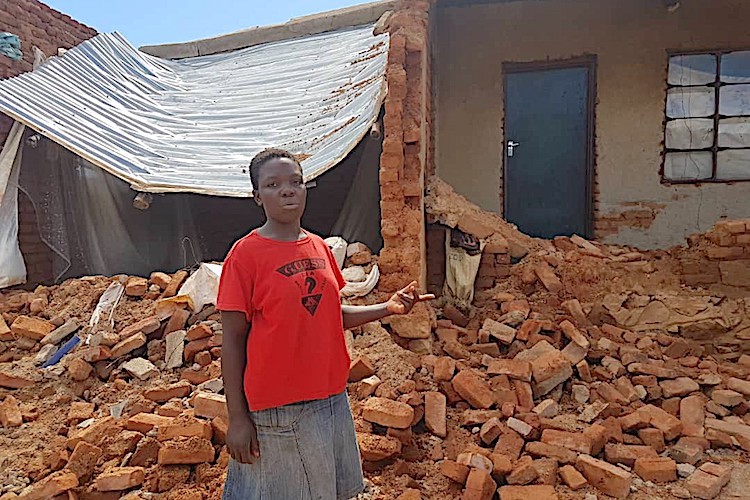
By Jeffrey Moyo
CHIMANIMANI, Zimbabwe (IDN) – The cyclone will affect the region for months to come after it impacted key livelihoods of fishing and agriculture in the largely rural region, the World Food Programme (WFP) said commenting the havoc caused by Cyclone Kenneth that struck Mozambique on April 25, nearly five weeks after the Cyclone Idai that lashed Southern Africa.
Some 31,000 hectares (76,600 acres) of crops were lost at the peak of the harvest season. “The area is already very vulnerable to food insecurity,” spokesman Herve Verhoosel said. (P04) JAPANESE TEXT VERSION PDF | PORTUGUESE | SWAHILI
On April 28, the Spokesman for UN Secretary-General António Guterres said the Secretary-General was “deeply saddened” at reports of loss of lives and destruction in Mozambique and Comoros as a result of Cyclone Kenneth. He made an appeal to the international community “for additional resources, which are critically needed to fund the response in the immediate, medium and longer term”.
Earlier, in Zimbabwe, Cyclone Idai – which knocked out Southern African countries like Mozambique, Malawi and Zimbabwe on the night of March 14-15, 2019 – left 57-year-old Murambi without a field to plant her crops even as the next cropping season beckons. “To me it has done the worst damage. I lost a husband because of the cyclone. I also lost the fields on which we used to grow our crops,” she told IDN.
In Malawi, the worst hard times have befallen many like 71-year old Agness Banda. “I’m the only one left in my family. My home was destroyed, my entire family was destroyed too and everything that belonged to us as a family was destroyed in the cyclone,” Banda told IDN.
“Impacts of climate change have reached catastrophic proportions across our region; cyclones like Idai are one of them,” Adias Muluzi, a climate change expert based in Blantyre, Malawi’s second largest city, told IDN.
For Mozambique, fighting hard to surmount climate change impacts of two tropical cyclones, it would rather take two to tango, as the country’s Health Minister Nazira Abdula says: “mitigating the negative impacts of climate change requires concerted efforts from various government sectors, our partners and society at large”.
Backed by the United Nations Development Programme (UNDP), Mozambique has been at pains to integrate disaster risk reduction and climate adaptation components in sectors such as agriculture, education, health, infrastructure and energy.
In Zimbabwe too, UNDP and partners have been implementing the Zimbabwe Resilience Building Fund, which provides the evidence base for policy making on resilience; strengthens resilience capacities of at-risk communities and provides cost effective response to emergencies via existing safety nets and other relevant programs.
Even in Malawi, UNDP with support from the Green Climate Fund, is providing correct weather predictions and increasing community-based early warning systems to 75 percent of the districts to benefit two million people.
UN Environment’s Regional Director for Africa, Juliette Biao, has also stressed the need for more and urgent investment in ecosystem-based disaster risk reduction and climate change adaptation to reduce the human and financial toll of natural disasters.
“Sound environmental management, climate change impacts and disaster responses are closely interlinked and require a more systematic and comprehensive approach to disaster risk management,” says Biao.
Joseph Tasosa, director of the Zimbabwe Environmental Trust is convinced of the pressing “need to think of improved awareness and emergency preparedness mechanisms to reinforce the resilience of local communities to the overwhelming climate change effects”.
Within the context of the Sendai Framework for Disaster Risk Reduction (2015-2030), UN Environment developed the Second Edition of the Awareness and preparedness for emergencies at local level (APELL) Handbook. Launched in 2015, this new edition highlights the importance of an integrated multi-hazard approach at local level, and emphases the importance of multi-stakeholder and all-of-society engagement.
Also, the UN Office for Disaster Risk Reduction in a 2018 report underlined the staggering financial impact of climate-related disasters. According to the report, “the last twenty years have seen a dramatic rise of 151 percent in direct economic losses from climate-related disasters”.
Mami Mizutori, the UN’s Special Representative for Disaster Risk Reduction has gone on record saying: “Cyclone Idai is a clear demonstration of the exposure and vulnerability of many low-lying cities and towns to sea-level rise as the impact of climate change continues to influence and disrupt normal weather patterns.”
“Climate change impacts like cyclone Idai will be felt more and more as we go and the impacts will grow more deadly; the worse is yet to come,” Happison Chikova, Zimbabwe’s independent climate change expert, told IDN.
Even to meteorological experts like Malawi’s Chimango Simengwa “rise in worldwide temperatures together with ocean warming, is causing tropical cyclones”. Warmer air temperatures mean more rains are held up and then released through cyclones such as Idai, says Joseph Tasosa of the Zimbabwe Environmental Trust. “Cyclone Idai came with about a year’s worth of rain in a short space of time,” Tasosa adds.
Against this background, observers recall that at the seventeenth session of the Conference of the Parties (COP 17) of the UN Framework Convention on Climate Change (UNFCCC) in Durban, the world’s rich nations pledged to ramp up aid to USD 100 billion per year in restorative climate funding to poorer nations by 2020. However, just 10 per cent of the climate change funding has been secured so far. [IDN-InDepthNews – 01 May 2019]
Photo: Cyclone Idai has impacted the lives and livelihoods of almost three million people across Mozambique, Zimbabwe and Malawi. Credit: UNDP Zimbabwe
IDN is flagship agency of the International Press Syndicate.
facebook.com/IDN.GoingDeeper – twitter.com/InDepthNews











